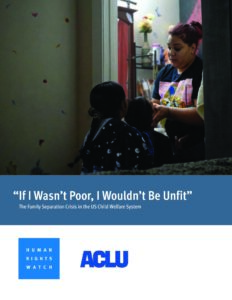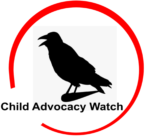 Child welfare systems in the United States too often treat poverty as the basis for charges of neglect and decisions to remove children from their parents, Human Rights Watch and the American Civil Liberties Union (ACLU) said in a recently released report.
Child welfare systems in the United States too often treat poverty as the basis for charges of neglect and decisions to remove children from their parents, Human Rights Watch and the American Civil Liberties Union (ACLU) said in a recently released report.
Titled, “If I Wasn’t Poor, I Wouldn’t Be Unfit: The Family Separation Crisis in the US Child Welfare System”, the report finds that child welfare systems too often respond to circumstances of poverty with punishment. Parents too often face charges of neglect and see their children removed from their care instead of receiving support to keep families together. Black and Indigenous families disproportionately face neglect charges and removals. In fact, federal and state data show racial and ethnic disparities exist at every stage of involvement, with particular harm to Black families. As a result, many parents, advocates, and experts describe the system not as one primarily of child protection, but as family “regulation” and “policing.”
One in three children in the United States will be part of a child welfare investigation by age 18. Every three minutes a child is removed from their home and placed in the foster system. Black children are almost twice as likely to experience investigations as white children and are more likely to be separated from their families. As a result, more than 200,000 children enter the foster system each year.
While the US child welfare system’s stated purpose is to improve child safety, permanency and well-being, and child welfare workers believe they are defending children’s rights to health and life, system interventions too often unnecessarily disrupt family integrity and cause harm to the very children they aim to protect.
As nearly all people involved in child welfare acknowledge, removing a child from their parents’ care, even for a short period of time, is a drastic measure that can cause profound harm. Those impacted are disproportionately communities of color, especially Black and Indigenous families, and people living in poverty.
To read the summary or download the report: <https://www.hrw.org/report/2022/11/17/if-i-wasnt-poor-i-wouldnt-be-unfit/family-separation-crisis-us-child-welfare> . Appendix 1 and II are responses from New York and Los Angeles County..

